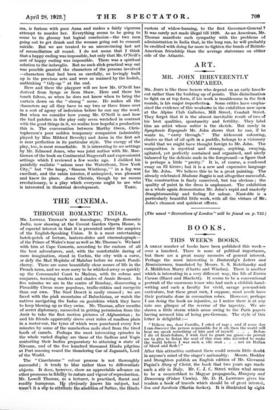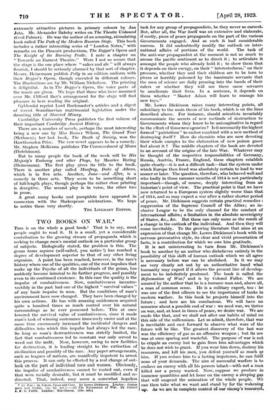BOOKS.
THIS WEEK'S BOOKS.
A GREAT number of books have been published this week— over a hundred. There is none of political importance,
but there are a great many memoirs of general interest. Perhaps the most interesting is Dostoevsky's Letters and Reminiscences, translated by Messrs. S. S. Koteliansky and J. Middleton Murry (Chatto and Windus). There is another which is interesting in a very different way, the life of Enrico Caruso (Hurst and Blackett). It seems to be a conventional portrait of the enormous tenor who had such a childish hand- writing and such a faculty for vivid, savage pen-and-ink caricature, but these great men, I suppose, must needs have their portraits done in coronation robes. However, perhaps I am doing the book an injustice, as I notice there is at any rate one glimpse of the reverse of the tapestry. We are shown a little storm which arose owing to the Paris papers having accused him of being pro-German. The style of this letter is delightful :—
" Believe me, dear Camillo, I cried of rage ; and if some day I can discover the person responsible for it all, then the world will hear me speak something of him and of myself. . . . Before I die of heart-failure, I wish God to grant me grace—to permit me to give to Satan the soul of this man who intended to make
the world believe I was such a vile man . . not an Italian of blood add flesh I "
After this attractive outburst there could remain little doubt in anyone's mind of the singer's nationality. Messrs. Hodder and Stoughton publish an English edition of Mr. Giovanni
Poplars Story of Christ, the book that two years ago made
such a stir in Italy. Mr. C. J. C. Street writes what seems to be a counterblast to Magyar propaganda, Hungary and
Democracy (Fisher Unwin). Mr. D. H. Lawrence gives his readers a book of travels which should be of great interest, Sea and Sardinia (Martin Seeker). It is illustrated by eight
extremely attractive pictures in primary colours by Jan Juta. Mr. Alexander Bakshy writes on The Theatre Unbound (Cecil Palmer). He was the author of an amusing, stimulating book called The Path of the Modern Russian Stage. This book includes a rather interesting series of " London Notes," with remarks on the Phoenix productions, The Beggar's Opera and The Knight of the Burning Pestle. I note a chapter on " Towards an Earnest Theatre." Were I not so secure that the stage is the one place where " cakes and ale " will always flourish, I should be seriously alarmed by that sort of chapter. Messrs. Heinemann publish Polly in an edition uniform with their Beggar's Opera, though executed in different colours. The illustrations are by Mr. William Nicholson. The printing is delightful. As in The Beggar's Opera, the voice parts of the music are given. We hope that those who have mourned over Mr. Clifford Bax's arrangement for the stage will find pleasure in here reading the original.
Gyldendal reprint Lord Buckmaster's articles and a digest of recent Scandinavian matrimonial legislation under the daunting title of Married Misery.
Cambridge University Press publishes the first volume of their important Cambridge Ancient History.
There are a number of novels, perhaps the most interesting being a new one by Miss Romt-r Wilson, The Grand Tour (Methuen) ; her last book, The Death of Society, won the Hawthornden Prize. The new novel appears to be a comedy. Mr. Stephen McKenna publishes The Commandment of Moses (Hutchinson).
But to many people the book of the week will be His Majesty's Embassy and other Plays, by Maurice Baring (Heinemann). The first play gives its title to the book. There is another play called Manfroy, Duke of Athens, which is in five acts. Another, June—and After, is a comedy in three acts. They seem to be something short of full-length plays, though perhaps the rather close printing is deceptive. The second play is in verse, the other two in prose.
A great many books and pamphlets have appeared in connexion with the Shakespeare celebrations. We hope



















































 Previous page
Previous page